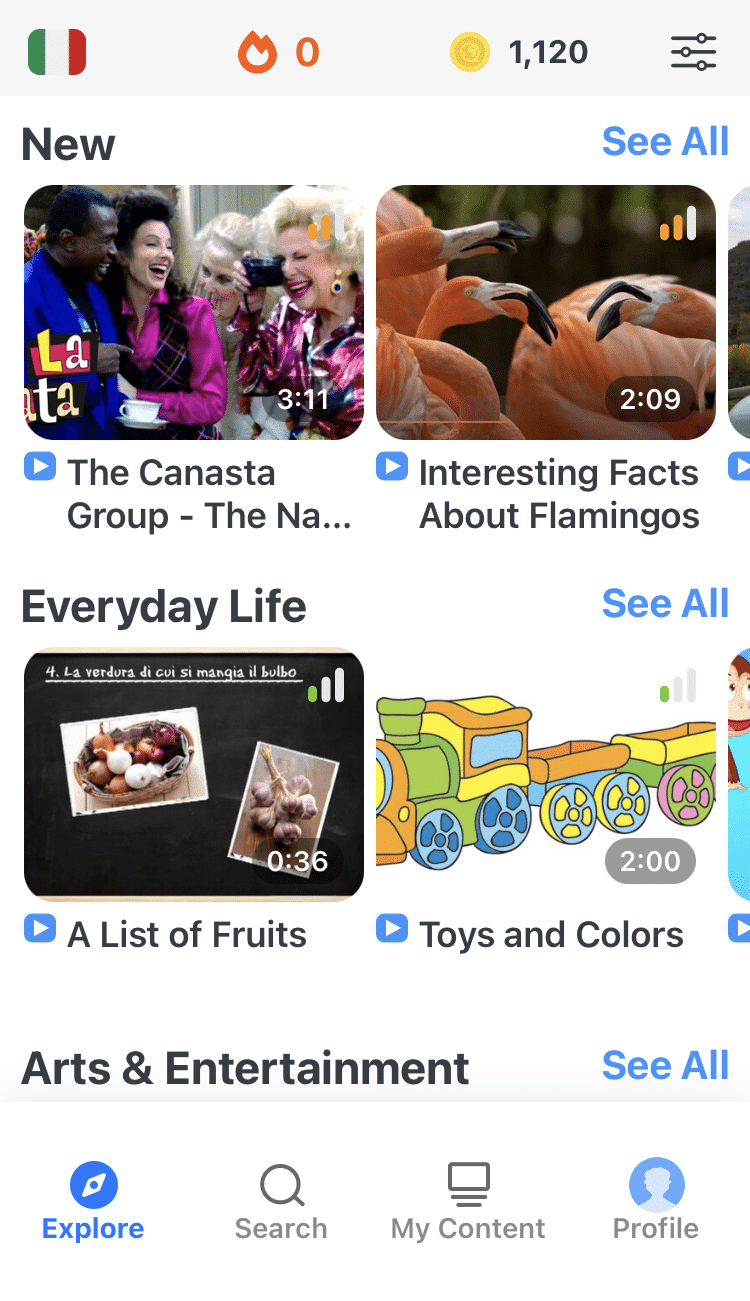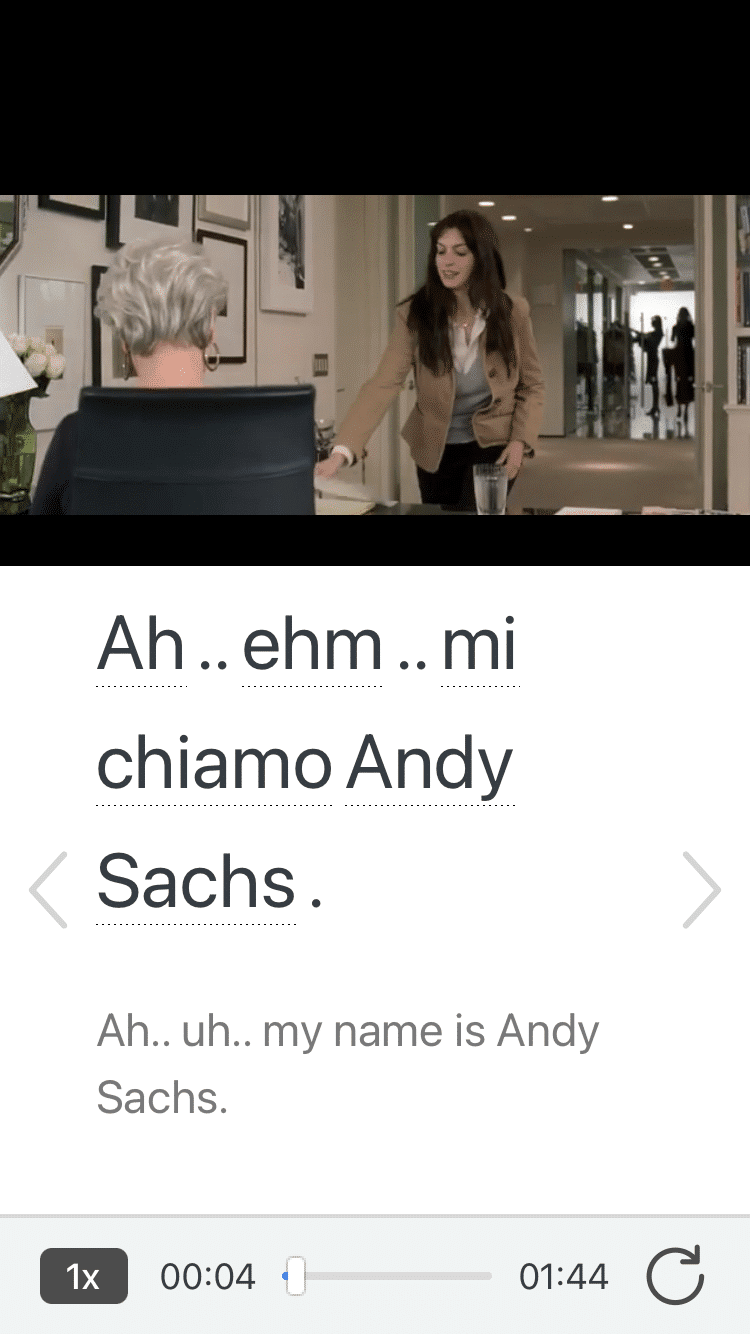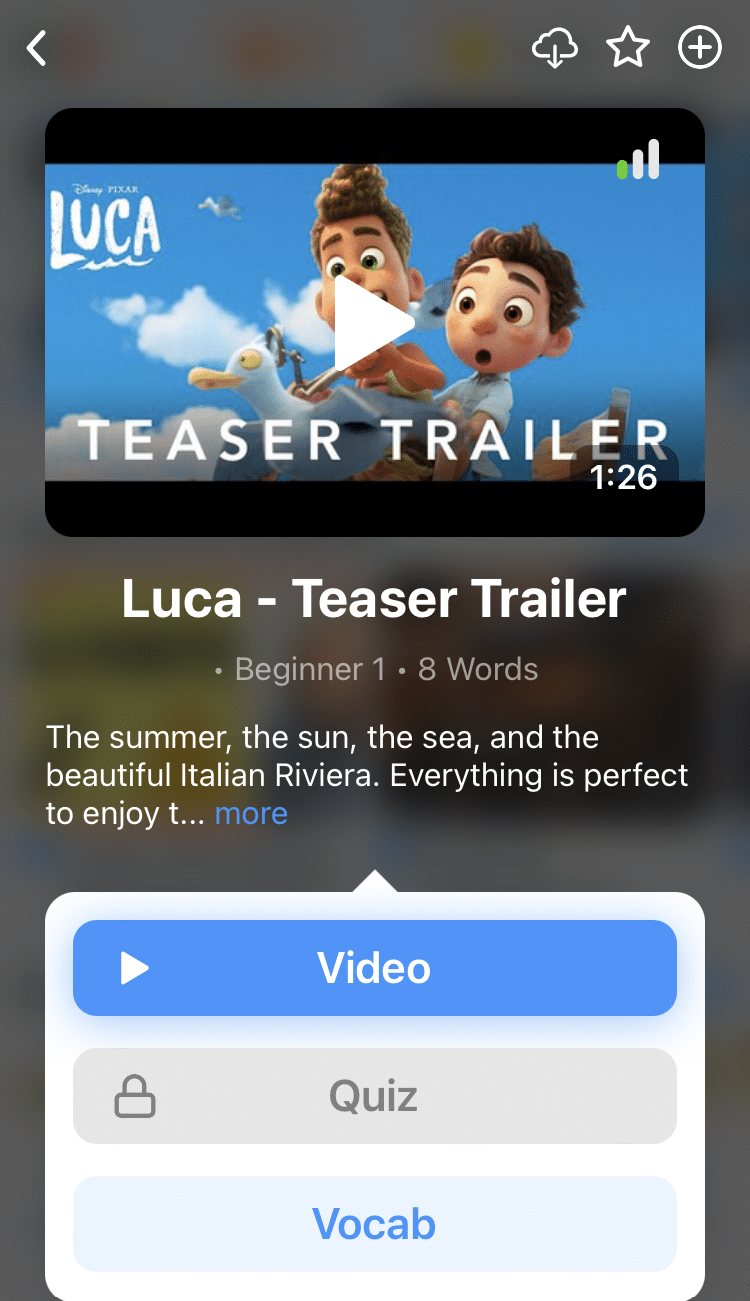
30 Italian Slang Words and Phrases
Have you been diligently studying Italian, but still struggle to understand some conversations?
Perhaps what you’re missing is Italian slang.
These 30 Italian slang phrases will round out your vocabulary and help you understand native speakers better. Plus you’ll sound more like a local yourself, so it’s a win-win situation!
We’ve also included audio and example sentences with the phrases to help you understand them better.
Ready to sound like a true Italian?
Contents
- Common Italian Slang Words and Phrases
- 1. Avere la testa tra le nuvole — To have one’s head in the clouds
- 2. Prendere la palla al balzo — To take advantage of an opportunity
- 3. Che palle! — How annoying!
- 4. Amore a prima vista — Love at first sight
- 5. Un/una guastafeste — Party pooper
- 6. Mettere il carro davanti ai buoi — Doing something badly or too early
- 7. Basta — Enough
- 8. Cadere a fagiolo — Perfect timing
- 9. Non fai scumbari — Stop embarrassing me
- 10. Boh! — I don’t know
- 11. Cogliere in castagna — To catch someone doing something bad
- 12. Figurati! — Don’t worry about it!
- 13. Avere le mani in pasta — Being involved in other’s affairs
- 14. Magari! — Maybe!
- 15. Come il cacio sui maccheroni — Perfect solution or situation
- 16. Mangiare cadaveri — To have bad breath
- 17. Mi fa cagare! — It’s terrible!
- 18. Dai! — Come on!
- 19. Meno male! — Thank God!
- 20. Beccare qualcuno — To hit on someone
- 21. Mollare qualcuno — To break up with someone
- 22. Essere (un po’) fuori — Someone who’s strange or wacky
- 23. Fuori come un balcone — Out of one’s mind
- 24. Tutto pepe — Someone who’s lively, happy and fun to be around
- 25. Vivere alla giornata — Take it one day at a time
- 26. Che figata! — How cool!
- 27. Cazzeggiare — To waste time/goof off
- 28. Farsi i fatti propri — To mind your own business
- 29. Vaffanculo! — No way!
- 30. Essere al verde — To be broke/without money
- Italian Internet Slang
- Resources to Learn More Italian Slang
- And One More Thing...
Download: This blog post is available as a convenient and portable PDF that you can take anywhere. Click here to get a copy. (Download)
Common Italian Slang Words and Phrases
1. Avere la testa tra le nuvole — To have one’s head in the clouds
This means “to have one’s head in the clouds.” As it does in English, this means that someone is distracted or aloof.
Example sentences:
A: Sei stanco? (Are you tired?)
B: No, perché? (No, why?)
A: Hai la testa tra le nuvole! (You’ve got your head in the clouds!)
2. Prendere la palla al balzo — To take advantage of an opportunity
This phrase literally translates as “to take the ball at the bounce,” but it means something more like “to take the bull by the horns” or that someone is taking control of a situation or taking advantage of an opportunity.
Example sentence:
Ho incontrato il capo d’azienda. Ho preso la palla al balzo, e ho chiesto per un lavoro. (I met the boss of the company. I took advantage of the situation, and I asked for a job.)
3. Che palle! — How annoying!
Speaking of balls, che palle translates literally to “what balls.” It really means “what a pain in the behind!”
You probably know the more explicit English version of that phrase, which helps you say that something is annoying.
Be careful of your company when you use this Italian slang phrase—grandma might not be into it.
Example sentences:
A: Ho perso il mio portafoglio e non posso uscire stasera. (I lost my wallet and can’t go out tonight.)
B: Che palle! (What a pain!)
4. Amore a prima vista — Love at first sight
Here’s another Italian slang expression that translates almost perfectly into English.
It literally translates to “love at first sight,” and describes people falling in love at their first encounter.
Example sentences:
A: Quando ho incontrato Gianni, è stato amore a prima vista. (When I met Gianni, it was love at first sight.)
B: Che bello! (How beautiful!)
5. Un/una guastafeste — Party pooper
Gustafeste is actually the combination of two Italian words: the verb guastare (to spoil/ruin) and the word festa (party). Together, we get the English “party pooper.”
This Italian slang is used for someone who refuses to participate in or ruins fun situations because they’re grumpy.
Example sentences:
A: Viene Gianni al cinema stasera? (Is Gianni coming to the movies tonight?)
B: No, è irritato e una guastafesta. (No, he’s irritated and a party pooper.)
6. Mettere il carro davanti ai buoi — Doing something badly or too early
This phrase literally translates as “to put the carriage in front of the oxen,” which is equivalent to the English phrase “put the cart before the horse.”
As in English, this Italian slang phrase refers to an action that isn’t done correctly, or an action that is done unconventionally or prematurely.
Example sentences:
A: Ho comprato una macchina! (I bought a car!)
B: Ma, perché? Non hai una patente! Metti il carro davanti ai buoi! (Why? You don’t have a license! You’re acting prematurely).
7. Basta — Enough
This is probably the most common Italian word. It simply means “enough” and you’ll hear it all the time in Italy.
Basta is used to put a stop to an undesirable situation or conversation.
Example sentences:
A: Gianni, sei sempre irritato! Perché non vuoi uscire con me? (Gianni, you’re always so irritated. Why don’t you want to go out with me?)
B: Basta! Sono stanco perché lavoro troppo! (That’s enough! I’m tired because I work too much!)
8. Cadere a fagiolo — Perfect timing
In Italian, cadere means “to fall” and fagiolo means “bean.”
The phrase cadere a fagiolo (“to fall at a bean”) is roughly equivalent to the English expression “perfect timing.”
Example sentences:
L’esame cade a fagiolo. So bene questa materia. (The exam came at the right time. I knew the material well.)
9. Non fai scumbari — Stop embarrassing me
As far as I know, this phrase has no literal English translation. It originated in the southern Italian dialect, and means something along the lines of “stop embarrassing me.” (It’s easy to imagine a 16-year-old me saying this to my parents!)
Example sentences:
A: Hai cambiato le tue banchiere intime oggi? (Did you change your underwear today?)
B: Basta, Mamma! Non fai scumbari! (Enough, Mom! Don’t embarrass me!)
10. Boh! — I don’t know
Another untranslatable Italian slang word, boh basically means “I don’t know.”
In fact, it often expresses more than a simple lack of knowledge about a subject. It conveys a particular disinterest in the conversation. It can, in a way, be translated as the English slang word “meh.”
Example sentences:
A: Quando viene Gianni a casa mia? (When is Gianni coming to my place?)
B: Boh! (I don’t know [and I don’t really care].)
11. Cogliere in castagna — To catch someone doing something bad
This phrase literally translates into English as “to catch in a chestnut.”
The meaning is something like “to catch someone red-handed,” or discover someone doing something bad while they’re doing it.
Example sentence:
A: Ho colto Gianni in castagna quando l’ho visto al cinema senza me! (I caught Gianni red-handed when I saw him at the movies without me!)
12. Figurati! — Don’t worry about it!
This Italian slang word comes from the verb figurare, which means “to be present” or “to appear.”
Despite that, it means “don’t worry about it” or “it’s nothing.” It indicates that the other person shouldn’t concern themselves with a situation.
Example sentences:
A: Mamma mia! Ho perso il mio portafoglio ancora. Non posso pagare il film! (Oh, no! I lost my wallet again. I can’t pay for the movie!)
B: Figurati! Pago per te! (Don’t worry about it! I’ll pay for you.)
Note that figurati can also mean “not at all.”
A: Ti disturbo? (Am I disturbing you?)
B: Ma no, figurati! (No, not at all!)
13. Avere le mani in pasta — Being involved in other’s affairs
This phrase literally translates to “having ones hands/fingers in the pie.”
This phrase refers to someone who is involved in another person’s affairs. It can have either a positive or negative sense.
Example sentences:
A: Come ha ottenuto Gianni quel posto nell’azienda? (How did Gianni get that job at the company?)
B: Ha le mani in pasta… (He’s well connected…)
14. Magari! — Maybe!
This Italian slang word literally translates as “maybe” or “if only.”
However, magari is often used in informal situations to express a desire for the improbable.
Example sentences:
A: Forse Gianni cucina il pesce stasera. (Maybe Gianni will cook fish tonight).
B: Magari! (If only!)
15. Come il cacio sui maccheroni — Perfect solution or situation
This phrase literally translates to “like sheep’s milk cheese on the macaroni.”
It’s meaning is just like the English phrase “just what the doctor ordered.” It describes a perfect solution or situation.
Example sentence:
Che meraviglia! Questo vino è come il cacio sui maccheroni! (How beautiful! This wine is just what the doctor ordered!)
16. Mangiare cadaveri — To have bad breath
This next Italian slang expression has a pretty dark translation, but it makes a lot of sense. It literally means “to eat dead bodies.” The intended meaning is “to have bad breath.”
How wonderfully to the point!
Example sentence:
Lavati i denti! Mangi cadaveri! (Brush your teeth! You have bad breath).
Note that this phrase may not be very common. Native Italian speakers generally use avere l’alitosi to mean “to have halitosis.”
17. Mi fa cagare! — It’s terrible!
This literally translates to “it makes me poop,” but it means something more like “it’s terrible!”
Be careful with this Italian slang phrase. Cagare is a pretty bad word in Italian, the approximate equivalent of the “F-word” in English.
Example sentence:
Mi sono schiantato con la macchina contro la casa! Mi fa cagare! (I crashed the car into the house! It’s terrible!)
18. Dai! — Come on!
Dai! is “Give!” in English, but means “come on!”
“Come on!” can be used in many situations in English, and those same situations can use dai! in Italian.
Example sentences:
A: Non ho voglia di uscire stasera. (I don’t want to go out tonight.)
B: Oh, Gianni. Dai! Ci divertiamo! (Oh, Gianni. Come on! It’ll be fun!)
19. Meno male! — Thank God!
This slang phrase is another with a literal translation that differs from its actual meaning. Meno male literally translates to “less bad.”
What it means is “Thank God!” It’s used for expressing relief or gratitude.
Example sentences:
A: Ho trovato il mio portafoglio! (I found my wallet!)
B: Meno male! (Thank God!)
20. Beccare qualcuno — To hit on someone
This is a super-literal slang phrase. The verb beccare means “to peck,” and the slang phrase means “to hit on someone.”
This phrase is a bit outdated and not commonly used in this way by native Italian speakers anymore.
Example sentences:
A: Voglio beccare questa donna. (I want to hit on this woman.)
B: Mamma mia, Gianni. Non fai scumbari! (My gosh, Gianni. Don’t embarrass me!)
Now, beccare qualcuno is more likely to mean “to catch someone.”
L’hanno beccato a rubare in un negozio. (They caught him shoplifting.)
21. Mollare qualcuno — To break up with someone
Mollare translates to “to release.” This Italian slang phrase means “to break up with someone” or to call off a romantic relationship.
Example sentence:
Devo mollare mio ragazzo. (I have to dump my boyfriend.)
22. Essere (un po’) fuori — Someone who’s strange or wacky
Essere (un po’) fuori literally translates as “to be outside.” It’s used to describe someone who’s strange or wacky.
Example sentences:
A: Perché ami Gianni? Lui è (un po’) fuori. (Why do you like Gianni? He’s (a little) wacky.)
B: Boh! È simpatico. (I don’t know. He’s nice.)
Un po’ can be replaced with the words totalmente (totally) or completamente (completely) to change the degree of the phrase.
23. Fuori come un balcone — Out of one’s mind
Speaking of the outside, fuori come un balcone literally translates to “outside like a balcony.”
This Italian slang phrase means “out of one’s mind” or “off one’s rocker.”
Example sentence:
Mamma mia! Gianni è fuori come un balcone e vuole beccare questa donna! (Oh, gosh! Gianni is out of his mind and wants to hit on this woman.)
24. Tutto pepe — Someone who’s lively, happy and fun to be around
In Italian, if someone is tutto pepe (“all pepper”), they’re lively, happy and fun to be around. You could even call them “the life of the party.”
This person could also be spicy, or what we might call “spunky.”
Example sentence:
Gianni, ti amo anche se tu non sei sempre tutto pepe. (Gianni, I love you even though you are not always lively).
25. Vivere alla giornata — Take it one day at a time
This slang expression literally translates as “to live during the day.”
It means something close to the English expression “to take it one day at a time” or “to live in the moment.”
Example sentence:
Gianni vive alla giornata. Non si preoccupa mai di nulla. (Gianni lives by the day. He does not ever worry about anything.)
26. Che figata! — How cool!
You can use this slang expression to express how awesome you think someone, or something, is.
Example sentence:
Che figata! Questa festa è fantastica! (How cool! This party is fantastic!)
27. Cazzeggiare — To waste time/goof off
When you want to skip school, call in sick for work or otherwise just waste time, you’re doing this Italian slang word. It means something like “to fool around” or “to goof around.”
Example sentence:
Dovresti studiare, non passare la giornata a cazzeggiare! (You should study, not spend your day goofing off!)
28. Farsi i fatti propri — To mind your own business
This literally translates to “take your own business,” but in Italian slang, it means to mind your own business and to stay out of others’ affairs.
Example sentences:
Non lo so. Meglio farsi i fatti propri. (I don’t know. We’d better mind our own business)
29. Vaffanculo! — No way!
Even though this is surely a controversial phrase and quite explicit, Italians use it like it’s going out of style. Literally meaning “Go do [it] in [the] a**,” it actually means something like “I can’t be bothered” or “no way” in English.
But be careful with this one—although many Italians repeat this phrase all day long, it doesn’t mean you can.
Example sentences:
A: Quanto vuoi per la Vespa? (How much do you want for the Vespa?)
B: Diecimila euro. (Ten thousand Euros.)
A: Vaffanculo! (No way!)
30. Essere al verde — To be broke/without money
This phrase has a long, complicated origin story involving church candles that had a green strip right before they were about to burn out. So when you saw the green, you were about to lose candle light. It literally means “to be at green” in Italian and in English, it simply means ‘”to be broke,” or “to have run out of money.”
Example sentence:
A: Vuoi uscire a cena stasera? (Want to go out to dinner tonight?)
B: Non posso! Sono al verde! (I can’t! I’m broke!)
Italian Internet Slang
Like in almost every language on earth, Italian has, over the years, developed a robust collection of Internet slang, which is often referred to as “italiano chat” or “linguaggio sms” in Italian. Often these terms are used because they’re easier to type out on a smart phone or keyboard. Think “LOL” in English.
Some common online slang terms are:
- Cmq — comunque (anyway)
- Xké — perché (why)
- Bho — boh (I don’t know)
- Tt — tutto (everything)
- C6 — ci sei (are you there?)
- Fk — facciamo (let’s do it)
- Vb — va bene (okay)
- Aha — ha ha (indication of laughing)
If you want to read more about Italian online slang, check out our full post on the topic:
Italian Text and Internet Slang: 75 Terms | FluentU Italian Blog
Italian text slang can really confuse you if you’re new to chatting with native speakers. Check out these 75+ common slang terms and abbreviations to avoid confusion and…
Resources to Learn More Italian Slang
There are hundreds of other slang expressions in Italian. Why not learn more of them?
One easy way to learn more is by watching some of the many YouTube videos about slang words and phrases or Italian idioms!
If you’re interested in more, you could also try a course. Babbel offers courses in informal Italian that could be a great solution for getting conversational quick, with quick 15 minute lessons.
If you want to learn more Italian slang (as well as grammar, vocabulary and accent), consider learning with FluentU.
FluentU takes authentic videos—like music videos, movie trailers, news and inspiring talks—and turns them into personalized language learning lessons.
You can try FluentU for free for 2 weeks. Check out the website or download the iOS app or Android app.
P.S. Click here to take advantage of our current sale! (Expires at the end of this month.)
Italian slang words and phrases in this post have stood up quite well over time. In fact, may would say they’re the most colorful additions la bella lingua (the beautiful language) has seen in centuries.
Dai! It’s time to learn your Italian slang!
Download: This blog post is available as a convenient and portable PDF that you can take anywhere. Click here to get a copy. (Download)
And One More Thing...
If you're as busy as most of us, you don't always have time for lengthy language lessons. The solution? FluentU!
Learn Italian with funny commericals, documentary excerpts and web series, as you can see here:

FluentU helps you get comfortable with everyday Italian by combining all the benefits of complete immersion and native-level conversations with interactive subtitles. Tap on any word to instantly see an image, in-context definition, example sentences and other videos in which the word is used.

Access a complete interactive transcript of every video under the Dialogue tab, and review words and phrases with convenient audio clips under Vocab.

Once you've watched a video, you can use FluentU's quizzes to actively practice all the vocabulary in that video. Swipe left or right to see more examples of the word you’re on.

FluentU will even keep track of all the Italian words you’re learning, and give you extra practice with difficult words. Plus, it'll tell you exactly when it's time for review. Now that's a 100% personalized experience!
The best part? You can try FluentU for free with a trial.
Start using the FluentU website on your computer or tablet or, better yet, download the FluentU app from the iTunes or Google Play store. Click here to take advantage of our current sale! (Expires at the end of this month.)



